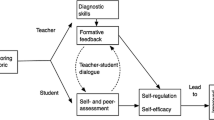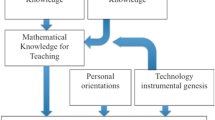Abstract
The following is a report on an investigation into ways of supporting teachers in converting challenging mathematics tasks into classroom lessons and supporting students in engaging with those tasks. Groups of primary and secondary teachers, respectively, were provided with documentation of ten lessons built around challenging tasks. Teachers responded to survey items in both Likert and free format style after teaching the ten lessons. The responses of the teacher participants indicate that the lesson structure we proposed was helpful, and the elements of the lessons suggested to teachers were both necessary and sufficient for supporting students in engaging with the challenging tasks. Implications for teacher educators and curriculum developers are offered.
Similar content being viewed by others
References
Bransford, J. B., Brown, A. L., & Cocking, R. R. (Eds.). (1999). How people learn: Brain, mind, experience, and school. London: Committee on Developments in the Science of Learning, National Research Council.
Clark, C. M., & Peterson, P. L. (1986). Teachers’ thought processes. In M. C. Wittrock (Ed.), Handbook of research on teaching (pp. 255–296). New York: Macmillan.
Cobb, P., & McClain, K. (1999). Supporting teachers’ learning in social and institutional context. In Fou-Lai Lin (Ed.), Proceedings of the 1999 international conference on mathematics teacher education (pp. 7–77). Taipei: National Taiwan Normal University.
Desforges, C., & Cockburn, A. (1987). Understanding the mathematics teacher: A study of practice in first schools. London: The Palmer Press.
Dooley, T. (2012). Constructing and consolidating mathematical entities in the context of whole class discussion. In J. Dindyal, L. P. Cheng, & S. F. Ng (Eds.), Mathematics education: Expanding horizons (Proceedings of the 35th conference of the mathematics education group of Australasia) (pp. 234–241). Singapore: MERGA.
Dweck, C. S. (2000). Self-theories: Their role in motivation, personality, and development. Philadelphia: Psychology Press.
Kelly, A. (2003). Research as design. Educational Researcher, 32(1), 3–4.
Lappan, G., Fey, T., Fitzgerald, W. M., Friel, S., & Phillips, E. D. (2006). Connected mathematics 2: Implementing and teaching guide. Boston, MA: Pearson, Prentice Hall.
Marshall, J., & Horton, R. (2011). The relationship of teacher-facilitated, inquiry-based instruction to student higher-order thinking. School Science and Mathematics, 111. http://www.freepatentsonline.com/article/School-Science-Mathematics/250321509.html.
Middleton, J. A. (1995). A study of intrinsic motivation in the mathematics classroom: A personal construct approach. Journal for Research in Mathematics Education, 26(3), 254–279.
Rollard, R. G. (2012). Synthesizing the evidence on classroom goal structures in middle and secondary schools: A meta analysis and narrative review. Review of Educational Research, 82(4), 396–435.
Smith, M. S., & Stein, M. K. (2011). Five practices for orchestrating productive mathematical discussions. Reston VA: National Council of Teacher of Mathematics.
Stein, M. K., Grover, B. W., & Henningsen, M. (1996). Building student capacity for mathematical thinking and reasoning: An analysis of mathematical tasks used in reform classrooms. American Educational Research Journal, 33(2), 455–488.
Sullivan, P., Clarke, D., & Clarke, B. (2013a). Teaching with tasks for effective mathematics learning. New York: Springer.
Sullivan, P., Clarke, D., Clarke, D., & Roche, A. (2013b). Teachers’ decisions about mathematics tasks when planning. In V. Steinle, L. Ball, & C. Bardini (Eds.), Mathematics education: Yesterday, today and tomorrow (Proceedings of the 36th annual conference of the Mathematics Research Group of Australasia) (pp. 626–633). Melbourne: MERGA.
Sullivan, P., Mousley, J., & Jorgensen, R. (2009). Tasks and pedagogies that facilitate mathematical problem solving. In B. Kaur (Ed.), Mathematical problem solving (pp. 17–42). Singapore / USA / UK World Scientific Publishing: Association of Mathematics Educators.
Tzur, R. (2008). Profound awareness of the learning paradox. In B. Jaworski & T. Wood (Eds.), The mathematics teacher educator as a developing professional (pp. 137–156). Sense: Rotterdam.
Wiliam, D. (1998). Open beginnings and open ends. Paper distributed at the open-ended questions discussion group international conference for the psychology of mathematics education. Stellenbosch, South Africa.
Wood, T. (2002). What does it mean to teach mathematics differently? In B. Barton, K. C. Irwin, M. Pfannkuch, & M. Thomas (Eds.), Mathematics education in the South Pacific (Proceedings of the 25th annual conference of the mathematics education research group of Australasia) (pp. 61–71). Auckland: MERGA.
Acknowledgments
The Encouraging Persistence Maintaining Challenge project is funded through an Australian Research Council Discovery Project Grant (DP110101027) and is a collaboration between the authors and their institutions. The views expressed are those of the authors. We acknowledge the generous participation of the project schools.
Author information
Authors and Affiliations
Corresponding author
Rights and permissions
About this article
Cite this article
Sullivan, P., Askew, M., Cheeseman, J. et al. Supporting teachers in structuring mathematics lessons involving challenging tasks. J Math Teacher Educ 18, 123–140 (2015). https://doi.org/10.1007/s10857-014-9279-2
Published:
Issue Date:
DOI: https://doi.org/10.1007/s10857-014-9279-2




